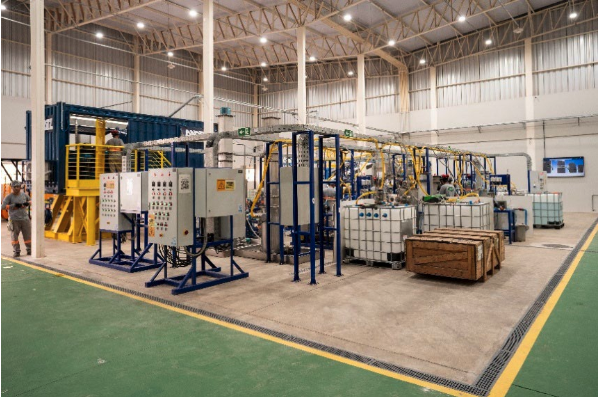Aclara Resources Inc. (Vancouver, B.C., Canada) announced the official inauguration of its semi-industrial heavy rare earths pilot plant facility in Aparecida de Goiania, Goias, Brazil. The ceremony was attended by key government authorities from the State of Goias, the Municipality of Nova Roma, and representatives from federal agencies and international embassies. The main products from this pilot plant are Dysprosium and Terbium, which, along with other heavy and light rare earths, will be contained in the carbonate produced by the facility. The Company expects to process approximately 200 tons of clays, resulting in an estimated production of 150 kilograms of heavy rare earth carbonates.
There is much interest in establishing more localized production and processing of rare-earth materials, with new plants planned or recently started up in: France at Solvay’s La Rochelle site, in Sakatoon, Canada at the Saskatchewan Research Council, in the South of France at Caremag, and at in Sweden at an LKAB demonstration facility.

Aclara’s pilot plant in in Aparecida de Goiania, Goias, Brazil (Source: Aclara Resources)
During the event, Aclara conducted a comprehensive tour of the new facility, showcasing its proprietary Circular Mineral Harvesting technology—an innovative and sustainable process at the core of the Company’s Carina Project. The new pilot plant incorporates several process optimizations designed to enhance efficiency, lower operating costs, and improve the purity of the final product. Government officials expressed their full support for the Project’s streamlined development, recognizing its strategic potential to position Goias as a global center for sustainable production of heavy rare earths, particularly dysprosium and terbium. They also emphasized the Project’s ability to deliver long-term economic growth, social development, and environmental value for the local communities and the State of Goias.
Ramón Barúa, Chief Executive Officer of Aclara commented: ““We extend our most sincere gratitude to the Brazilian authorities and the community of Nova Roma for their extensive support and shared commitment to accelerating the implementation of the Carina Project. During the inauguration, they experienced firsthand our unique proprietary technology, witnessing how clean and simple our process is for producing critical heavy rare earths such as dysprosium and terbium. The Carina Project´s future production of these key elements will enable the fabrication of approximately five million electric vehicles per year, positioning Goias at the forefront in the global energy transition. Aclara remains fully committed to working in close partnership with the Government of Goiás and community of Nova Roma to ensure the long-term success of the Project and proudly reaffirm our goal to commence operations by 2028. To that end, we are pleased to be on track to submit the Environmental Impact Assessment for the Carina Project in Q2 2025, the Pre feasibility Study in Q3 2025, and the Feasibility Study in Q1 2026.”
During the event, Ramón Barúa emphasized that Aclara’s operations are driven by principles of responsible mining, highlighting several key innovations and sustainability features from its proprietary technology, Circular Mineral Harvesting:
- Simple, shallow excavation (average depth of 15 meters) with no blasting;
- Elimination of crushing or milling—two of the most energy-intensive processes in mining—resulting in a significantly reduced carbon footprint;
- Zero liquid discharge;
- No requirement for a tailings dam;
- Recirculation of over 95% of the water used in the process;
- Recovery of 99% of the primary reagent, a commonly used fertilizer;
- Processed clays that are compatible for full reforestation
“Our heavy rare earth production, dysprosium and terbium, will be essential for establishing a reliable and alternative supply chain for the permanent magnets used in electric vehicles, wind turbines, robotics and other advanced technologies. As part of this goal, we are also rapidly advancing the development of our separation facility in the Unites States, which aims to transform the heavy rare earth carbonates from the Carina Project into individual rare earth oxides. In parallel, through a joint venture with our Chilean partner, CAP S.A., we are progressing on a project to convert these individual oxides into the alloys needed to produce permanent magnets. Our vision is to become the leading partner for Western customers, delivering high-quality, sustainable mine-to-magnet solutions that drive the future of clean technology,” commented Barúa.
The new pilot plant incorporates several optimizations to the process flowsheet, building on the Company’s previous piloting efforts in Chile, where 25 tons of clays from the Carina Project were processed. The Company expects to process approximately 200 tons of clays, resulting in an estimated production of 150 kilograms of heavy rare earth carbonates. Aclara’s optimized approach is focused on increasing efficiency, reducing costs, and improving the purity of the final product.